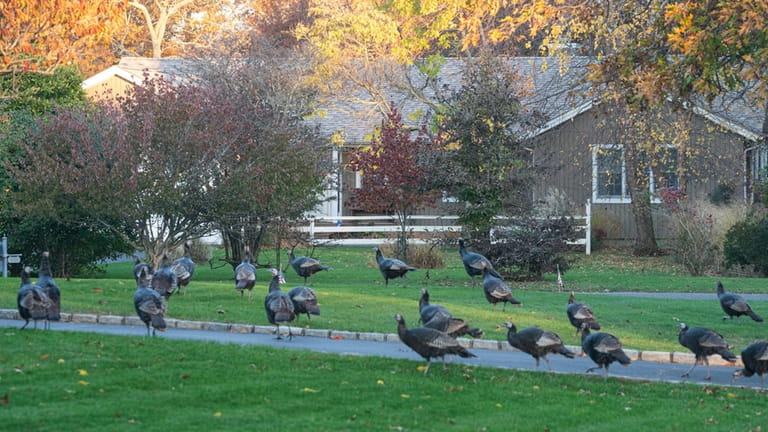Turkeys escape Thanksgiving table with Long Island families
Stepping slowly through crunchy leaves, Mega Mort towers over the roosters, chickens, ducks and cats that have all come to call a backyard in Aquebogue home.
He gobbles up handfuls of leftover pasta, offered to him by his owner, Virginia Scudder.
"He thinks he's the leader, for sure," she said with a smile, as her turkey trotted right through a group of quacking ducks.
Several Long Islanders have taken in turkeys, priming their backyards with everything their feathery friends need to be comfortable and protected. Additionally, Humane Long Island rescues turkeys every fall from live slaughter markets and makes them available for foster and, in some cases, adoption.
"All birds have a lot of personality, but turkeys really show their personality to humans more than anyone else," said John Di Leonardo, an anthrozoologist and executive director of Humane Long Island, which he runs out of his home in Moriches. "They love having their bellies rubbed. If you speak to turkeys, they will talk back to you. And the boys like to show off to the ladies ... whether you're a turkey gal or a human gal."
The extroverted nature and intelligence of turkeys make them great pets, owners agree. But preparing your property to support these majestic birds is essential before welcoming them in.
How much room do turkeys need?
Mega Mort is a 35-pound turkey cared for by Virginia Scudder of Aquebogue. Credit: Randee Daddona
In the '90s, the New York State Department of Environmental Conservation captured about 75 wild turkeys upstate, according to their website. They released the turkeys throughout Suffolk County. Now, the population on Long Island is estimated to be 3,000 birds and counting.
Construction projects on Long Island are causing wild turkeys to become a more common sighting than ever before, said Frankie Floridia, president of Strong Island Animal Rescue League.
"They're prominent all over the place lately," he said. "We get a lot of calls. People haven't really seen them before. It's due to a lot of the wooded areas that we have here on Long Island being ripped down and used for building."
Since Long Islanders aren’t used to seeing wild turkeys around, there’s a misconception that the region is overpopulated with them, said Di Leonardo. But he noted that the wild turkey populations were prominent here until they were hunted and nearly wiped out in New York, before their resurgence in the ’90s.
In some cases, these turkeys acclimate to residential areas and become comfortable around people. When rescuing a turkey, Floridia will typically use a net and safely lead them into a large carrying case that contains holes, so they can breathe.
"A wild turkey, we would just rehab and release back into the wild," Floridia said. "There are domestic turkeys out there that sometimes get dumped, or people surrender them because they can't take care of them anymore, and those are the ones we find homes for."
Scudder took in her domestic turkey during the COVID-19 pandemic, after seeing a Facebook post from another local animal lover saying she could no longer care for him. Scudder already had roosters, chickens and ducks at the time.
"He integrated very quickly into the flock," said Scudder, who runs North Fork Country Kids Animal Rescue to help assist Long Island's feral cat population. When she's not taking care of her animals and children, she also teaches 10th and 12th grade English at West Islip High School.
The birds on her 1-acre property can roam the backyard as they please. They only stay inside at night, in a pen her father constructed from treated lumber and pond lining, to hold warmth. He also nailed crates to plywood to create roosting boxes, Scudder said. The cost of materials totaled $500 to $600, she estimated.
In addition, Scudder ensures there is always grain, straw and fresh water available for all of the birds, and must clean urine out of the pen as quickly as possible. Straw, feed and bedding cost around $250 to $300 a month, Scudder said.
"Turkeys are very smart, and cleaner than chickens," she added. "They will try to maintain their bedding."
Scudder said her neighbors always get a kick out of seeing 35-pound Mega Mort around, although he can come off as intimidating at first.
You need lots of room for turkeys ... Nobody wants to be cooped up — no pun intended.
— Virginia Scudder
"He'll definitely walk the perimeter of the yard and just let them know, 'Hey I'm here,' but it's really just that he wants to be friends," she said. Many of her neighbors are bird owners too, but Mega Mort is the only turkey on the block, she added.
One of the most important keys for anyone who wants to take care of turkeys on their land: wide-open space. Di Leonardo recommends at least 1 acre of property to care for a small flock of turkeys (between three and five birds).
"You need lots of room for turkeys," Scudder said. "They need to be able to move around freely and stretch out their feathers, walk around and just be able to enjoy life, just like any of us would want to. Nobody wants to be cooped up — no pun intended."
Can you keep turkeys on Long Island?
Every year around November, Humane Long Island rescues broad breasted white turkeys, which are "typically the ones on the Thanksgiving dinner table," Di Leonardo said. The organization finds Long Islanders to foster these turkeys before they head to various animal sanctuaries in New York, New Jersey, Pennsylvania and North Carolina.
He added that in order to care for a turkey on your property, it is imperative to make sure your area is properly zoned for fowl.
"Typically, most municipalities on Long Island don't have regulations specifically for turkeys," Di Leonardo said. "But they have regulations for fowl, which turkeys are. So the same laws that apply to ducks and chickens will also apply to turkeys. Some places that would be allowed to foster are Southampton, Southold, Riverhead and the Town of Islip."
Building a pen on your property, like Scudder has, is also important to do ahead of time. According to the Global Federation of Animal Sanctuaries, indoor barns or shelters should have "a minimum of 4 square feet of open floor space" per medium-sized bird (turkeys, geese, large chickens and ducks).
For outdoor spaces, like a run or netted aviary, the organization recommends a minimum of 16 square feet per bird.
"People need to have a predator-proof, climate-proof house where the animals are kept at night," Di Leonardo said.
The pens should be kept warm, but in a safe way, such as by using straw.
"We don't recommend heating lamps, since they're prone to fire," Di Leonardo said. "And if you overheat the birds, they don't develop a climate resistance."
John and Juliana Di Leonardo run Humane Long Island, which rescues turkeys every fall and makes them available for foster and, in some cases, adoption. Credit: Elizabeth Sagarin
You can't have just one bird. You need to have a proper flock ...
— John Di Leonardo, anthrozoologist and executive director of Humane Long Island
And of course, like humans, birds need companionship. Turkeys are not guaranteed to always get along with each other — Scudder had that experience when trying to introduce Mega Mort to another domestic turkey. She plans to bring in a different one soon to try again, she said.
But having a flock is valuable to their well-being.
"You can't have just one bird," Di Leonardo said, noting that the minimum number of any species to own is three. "You need to have a proper flock, whether for a turkey, duck or chicken. They need a family, and don't do well alone if you raise them alone as babies. They imprint on people, which some people may think is cute, but really does a number on their welfare."
Typically, turkeys rescued from live slaughter markets are sick upon arriving at their next location, Di Leonardo said. "They often have parasites, and I think last year we had one with a severe upper respiratory infection, and another had a large wound," he said. "Often these animals are in such bad shape, you should bring them right to the emergency vet."
So make sure your property has enough space and a secondary structure to quarantine your turkey from any other birds until they recover, Di Leonardo said.
Floridia encourages anyone who spots a wild turkey in distress in their neighborhood to contact Strong Island, who will trap the turkey and bring them to Sweetbriar Nature Center in Smithtown for rehabilitation. After that, Strong Island will rerelease the turkey.
As for domestic turkeys: "They're interactive animals, and they know their people," Floridia said.
What to know before adopting a turkey

Wild turkeys roam a Southold neighborhood on Nov. 11, 2023. Credit: Randee Daddona
No one should be adopting an animal like a turkey, chicken or rabbit just as a spur-of-the-moment idea ... You have to realize there's care involved, and maintenance.
— Virginia Scudder
For four years, Colleen Hildreth has been taking care of two domestic turkeys on her small, private farm in Southampton. She adopted them from someone who had been raising them since they were chicks.
"I didn't want anybody to eat them," said Hildreth, whose family owns the Hildreth's Home Goods store in Southampton. "So I offered to give them a safe home."
In some cases, Hildreth has noticed people don't realize what they're getting into when they adopt baby animals, whether they're chicks or newborn bunnies.
"They'll think they're so cute, but then they get older and start to smell," she said. "And [turkeys] are big birds; they're probably 25 pounds, and they can be noisy."
Hildreth, who has always been an animal lover, has also rescued ducks, geese, chicken and roosters. Her turkeys are a special part of this balance.
"They help to keep away hawks and other predators because of their size and their noise," she said. "So I enjoy having them. They get along with everybody."
There are a few warning signs that indicate when a turkey is feeling threatened, and both Hildreth and Scudder have identified them through the years. Hildreth cited a "throaty noise" while Scudder noticed her turkey dragging his feathers along the ground.
They help to keep away hawks and other predators because of their size and their noise. So I enjoy having them. They get along with everybody.
— Colleen Hildreth
"They can sense fear, like any other animal," Scudder said. "So you have to be aware and want them to know you're a friend and you're there to protect them, rather than hurt them."
Potential turkey owners may not realize the amount of work required, especially during the wintertime, Scudder said. For example, she provides two pools of water in her backyard, which need to be checked and cleaned twice a day, because some of her birds swim in them while others only use it for drinking.
"It's one of the things that people don't think about, because who wants to go out in the snow and in the rain," she said. "But if you're going to own turkeys or ducks or chickens, they need to have fresh water daily."
Scudder and Mega Mort became fast friends — he lets her pet the soft feathers down his back, even letting out some gentle purrs. But local advocates and animal lovers agree: Turkeys are a big commitment.
And for many, it's worth it.
"No one should be adopting an animal like a turkey, chicken or rabbit just as a spur-of-the-moment idea, because they think it's cute for holiday pictures," Scudder said. "You have to realize there's care involved, and maintenance."

